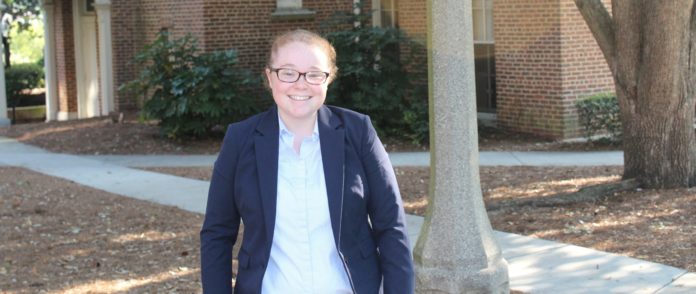A Mercer senior hopes to help strengthen the bonds between families and their loved ones who are incarcerated. Taylor Rinberger, a psychology major and Mercer Service Scholar, plans to donate books, crayons and puzzles to a Middle Georgia prison to enhance the family visitation experience.
In the fall, she pitched her idea at the Visionary Student Panel event organized by Mercer’s Research That Reaches Out office, and she is putting her plan to action this semester.
Rinberger, who grew up in South Georgia, said her own family experience served as the inspiration for her senior project.
“When I was in the second grade, my uncle was incarcerated, and it kind of flipped my entire family’s life around. We didn’t know anything about the system or how things would work,” she said.
Soon after, her grandmother started a fellowship program for people who had incarcerated family members at the prison. Participants did things like collect personal hygiene products for the prisoners and cards that they could send to their families.
Once, they donated toys, games and books to the visitation center, and the warden liked that so much that he had the shop crew build a bookshelf and lounge chairs so parents and kids could sit together more comfortably. Rinberger remembers seeing children laughing and staying engaged as they visited with their parents.
“That was my favorite project,” she said. “As I’ve grown older, I’ve remembered the kind of impact that had on that facility. I want to have that same kind of impact in the Middle Georgia area and for families that are hurting here.”
Rinberger received Quality Enhancement Plan (QEP) funding to purchase 15 to 20 books, 15 to 20 coloring books and crayons, and a few puzzles. She also wants to provide re-entry information for the incarcerated individuals. Rinberger said Georgia has one of the highest recidivism rates in the nation. It’s a vicious cycle as people who are released from prison often end up right back there.
“By increasing family bonding, by having your support system strengthened, it helps reduce this rate,” she said. “My project will focus on helping provide these resources and using my research skills that I’ve gained at Mercer to point them to community resources that can continue to help them.”
Rinberger plans to collect data to measure the impact of her initiative. She wants to see if it increases feelings of bonding between family members and awareness of re-entry resources in Middle Georgia.
Right now, Rinberger is in the process of finding a local prison or halfway house to partner with her on the project. She hopes to expand its scope as a student at Mercer Law School this fall.
“Taylor’s project is so well developed,” said Hannah Vann Nabi, associate director of QEP/Research That Reaches Out. “When I first met her, I was moved by her passion for criminal justice reform and the humility and earnestness with which she approaches this project. The amount of research she has done to understand and define the need that she wants to address is impressive and instills confidence in her ability to get things done. She possesses a deep understanding of the complexity of issues surrounding our criminal justice system and has developed a targeted, thoughtful project that is both realistic in scope and sustainable in cost and maintenance.”
Rinberger said she’ll consider her project a success if it helps just one family. It can be easy for families in these situations to feel isolated and alone, and she wants to prevent that.
“My goal is to establish this support system and reduce the stigma associated with talking about incarceration,” she said. “Just because people make a bad choice doesn’t make them a bad person. They’re your family. You don’t have to support what they did, but you don’t stop loving them.”










